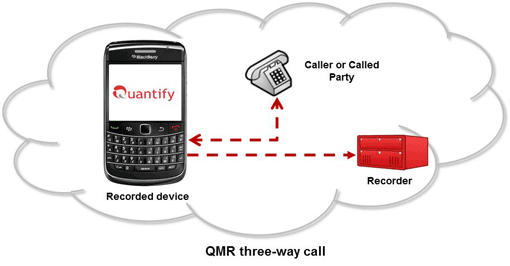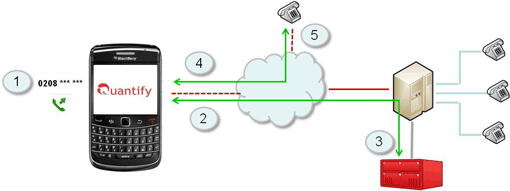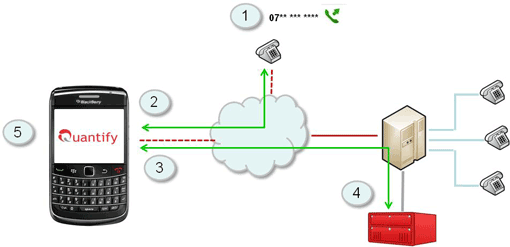Recording Mobile Calls
Increasingly, the trend in today’s business world is towards more flexible working practices. This might require customer-facing calls to be made from locations other than the main office sites of the organisation: from home, or even while travelling. Inevitably, this means using mobile phones.
Traditionally, this meant that such calls could not be recorded for training and monitoring purposes with the same facility available for fixed-line calls.
The latest FSA requirements
Compliance – the requirement
From November 2011 FSA-regulated investment firms in the UK – from banks
to high street stockbrokers – must record all ‘relevant conversations’ conducted on mobile devices and store them for six months.
The standards involved are FSA COBS11.8, MiFID and BS 10008.
Recording solutions
There are two main solutions for recording mobile phones:
- Use a special prefix before dialling a call
- Install an application on a mobile phone
Using a special prefix
Incoming calls could be routed through an 0845 number that could then be routed to a mobile phone. For outgoing calls special prefixes need to be added to route calls through a call recording platform.
This method is not particularly elegant, but does enable calls to be recorded.
Recording calls using an application on the mobile phone
It is possible to allow automatic recording of mobile calls on any GSM network, for any mobile using the Symbian operating system. Applications for other operating systems such as Windows Mobile and BlackBerry are also available.
The system is simple. An application is downloaded onto the mobile. Once a call is made, either incoming or outgoing, the application starts a conference call with the recording solution. The call and all associated call data are stored centrally and can be replayed on demand, allowing the performance of the company’s operative to be assessed. It also helps avoid any litigious situation; the system is so secure that it can be used in a court of law.

The system is seamless, dovetailing perfectly with fixed-line call recording. It can be integrated and combined with fixed-phone recording in the same call recording solution.
It’s automatic, so there is no need to worry about calls being missed. Once the application is downloaded, all calls from the mobile are automatically recorded – with no need to enter prefixes.
It is also flexible, requiring no middleware and no additional SIM cards. All that is needed is the mobile phone and the application to be downloaded.
Users cannot bypass or delete any calls or data; in fact, they are barely aware that they are being recorded and enjoy almost instant connection.
Benefits of using mobile phone recording:
- Allows customer-facing calls to be made and taken from remote locations
- Facilitates flexible working practices
- Seamless integration with fixed-line recording
- Automatic, ensuring all incoming and outgoing mobile calls are recorded
- Secure recording avoids tampering or unauthorised access to recorded calls
- No middleware required
Call Flow
The call flow for the recorded device and caller/called party differs slightly from an inbound to an outbound as detailed below:
Outbound Call
- Recorded device user enters number to call and presses the call button.
- The application holds original call number and dials pre-configured DDI.
- Recorder answers call from the application and starts recording.
- The application places recorder on hold and dials original call number.
- Called party answers and the application initiates three-way call

Inbound Call
- Other party calls the recorded mobile device (with the application installed).
- User answers the call and the application places other party on hold automatically.
- The application dials pre-configured DDI.
- Recorder answers call from the application and starts recording.
- The application initiates three-way call and callers are connected.

I Don’t Want Private Calls Recorded
Some mobile call recording solutions offer the ability to register a ‘White List’ of telephone numbers for each user that will NOT be recorded, allowing calls to family and friends to be kept private.
The White list is managed by the system administrator ensuring control over the functionality. The White list can be administered by the Administrator and updates are sent to the mobile device via SMS, allowing for fast easy control and management of the solution without impact to the end user and requiring no need for outside support.
The User Experience
The mobile call recoring application carries out actions and reacts to events within a fraction of a second. The delay experienced by either the device user or other party differs for inbound and outbound calls depending on several factors many of which are network based and outside the control of the recording application..
- Outbound call Device User: The delay experienced for the recorded device in establishing the three-way call will differ depending upon the recorder interface method and the specific mobile carrier. Tests have shown this could take up to 8 seconds to establish the recorded call.
- Outbound call Other Party: There is no delay experienced to the other party for an outbound call.
- Inbound call Device User: Once the user answers a call the delay experienced for the recorded device in establishing the three-way call will differ depending upon the recorder interface method and the specific mobile carrier. Tests have shown this could take up to 6 seconds to establish the recorded call.
- Inbound call Other Party: Once the device user answers a call the delay experienced for the other party in establishing the three-way call will differ depending upon the recorder interface method and the specific mobile carrier. Tests have shown this could take up to 8 seconds to establish the recorded call at which point the Other Party will be on hold.
Contributors
- Red Box Recorders
- David Vickery
- NICE Systems
Author: Jonty Pearce
Published On: 6th Apr 2010 - Last modified: 7th Apr 2021
Read more about - Technology, NiCE
















